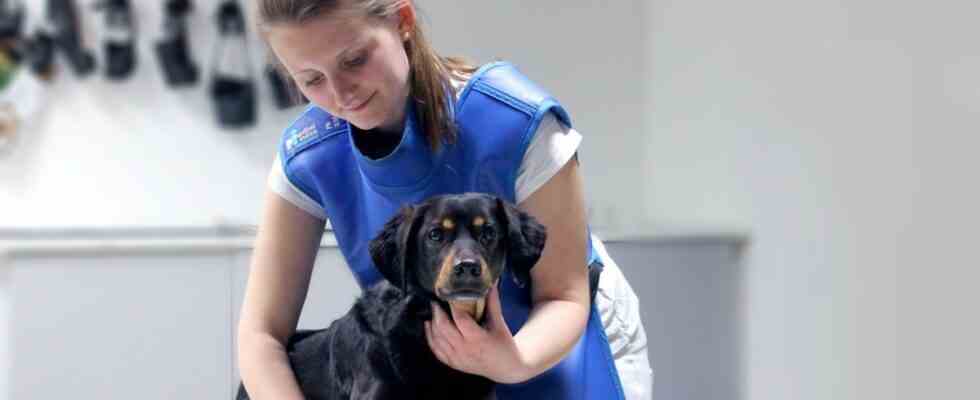It’s a nightmare for every pet owner: Bello doesn’t want to eat anything anymore, howls all the time and just lies in his basket, contorted in pain. And all of this on Saturday evening of all days, when your trusted veterinarian is away on a well-deserved weekend. There is only one thing to do: dial the number of a veterinary clinic and hope that you can get help for your four-legged friend quickly.
The district of Munich is well positioned with its three facilities in Ismaning, Haar and Oberhaching, and if all else fails, those affected can still contact the medical small animal clinic of the Ludwig-Maximilians-University (LMU) on Veterinärstraße in Maxvorstadt. They are all open 24 hours a day, 365 days a year and, like the emergency rooms in human hospitals, serve as contact points for pet owners if the dog, cat or guinea pig suddenly becomes seriously ill.
The pet boom during the pandemic is exacerbating the situation
But similar to the human medicine clinics, the facilities for animal emergencies have been suffering from an acute shortage of staff for years, so that at least the Ismaninger veterinary clinic is now sounding the alarm. The reason: More and more veterinary clinics in Bavaria are withdrawing from the emergency service, the rest can hardly shoulder the additional burden, describe those responsible there in drastic words: “Imagine: Your dog has a torsion of the stomach and only an emergency operation can do it save him. But you’re standing in front of locked clinic doors and the next operating theater is a two-hour drive away.” What sounds like a nightmare for pet owners could soon become reality everywhere in Bavaria. “We are one of the last clinics in the Munich area to even offer a 24/7 emergency service, and as a result we often work at the breaking point,” complains the owner of the Ismaning veterinary clinic, Felix Neuerer.
According to Neuerer, it has been observed for some time that there are increasing gaps in the veterinary emergency service in Bavaria. The number of Bavarian small animal clinics has shrunk from 25 to 20 within three years (as of the end of 2020) – and the number continues to crumble. The care of acute emergencies in the Munich area is in fewer and fewer hands.
According to Neuerer, the pandemic with its pet boom accelerated this development. Because many people bought an animal during the lockdown, the veterinary care for the many new patients had already become a test of strength during the day. It is an enormous additional burden for the Ismaning Animal Clinic and its veterinarians and medical staff “when desperate animal owners from Regensburg, Dingolfing, Ingolstadt and Landshut are now queuing up in the emergency room due to a lack of alternatives”. The small animal clinic in the north of Munich often reaches its capacity limits, especially at night and on weekends.
When the cat is sick, the owners suffer too.
(Photo: Animal Clinic Ismaning)
According to a statement from the clinic, Neuer and his partner Klaus Zahn regularly have to calm down excited customers and ask for their understanding for long waiting times. The rush is often so great that the clinic even had to temporarily stop admissions to the dog or cat station. In the past week, for example, the Ismaninger could not offer the emergency service in the evenings and at night due to a lack of staff, as reported by Marina Wankerl from the management of the Ismaninger veterinary clinic when asked by SZ.
There is a lack of qualified staff “who are also willing to take on emergency services outside regular opening hours and also listen to the often insulting abuse of customers who are frustrated by the waiting times”. The younger generation in particular has a different idea of work-life balance “than the so-called baby boomers who will be retiring in the next few years”. The search for motivated employees is made more difficult by the fact that the first animal health centers are already tempting with jobs without mandatory night and weekend shifts. Neuer is aware that he can hardly do anything to change the situation himself, but calls for a political solution. He has often asked the Bavarian State Chamber of Veterinarians for help to avert the impending collapse – in vain. There is no need for action there.
What could ease the precarious situation for the existing clinics would be the participation of resident veterinarians in an emergency service for dogs or cats in the evenings and at weekends, as Marina Wankerl from the management of the Ismaninger veterinary clinic says. Such an offer would be comparable in a certain way to the medical emergency service of the Association of Statutory Health Insurance Physicians for people. Such a service could also provide some relaxation in Haar and Oberhaching.

